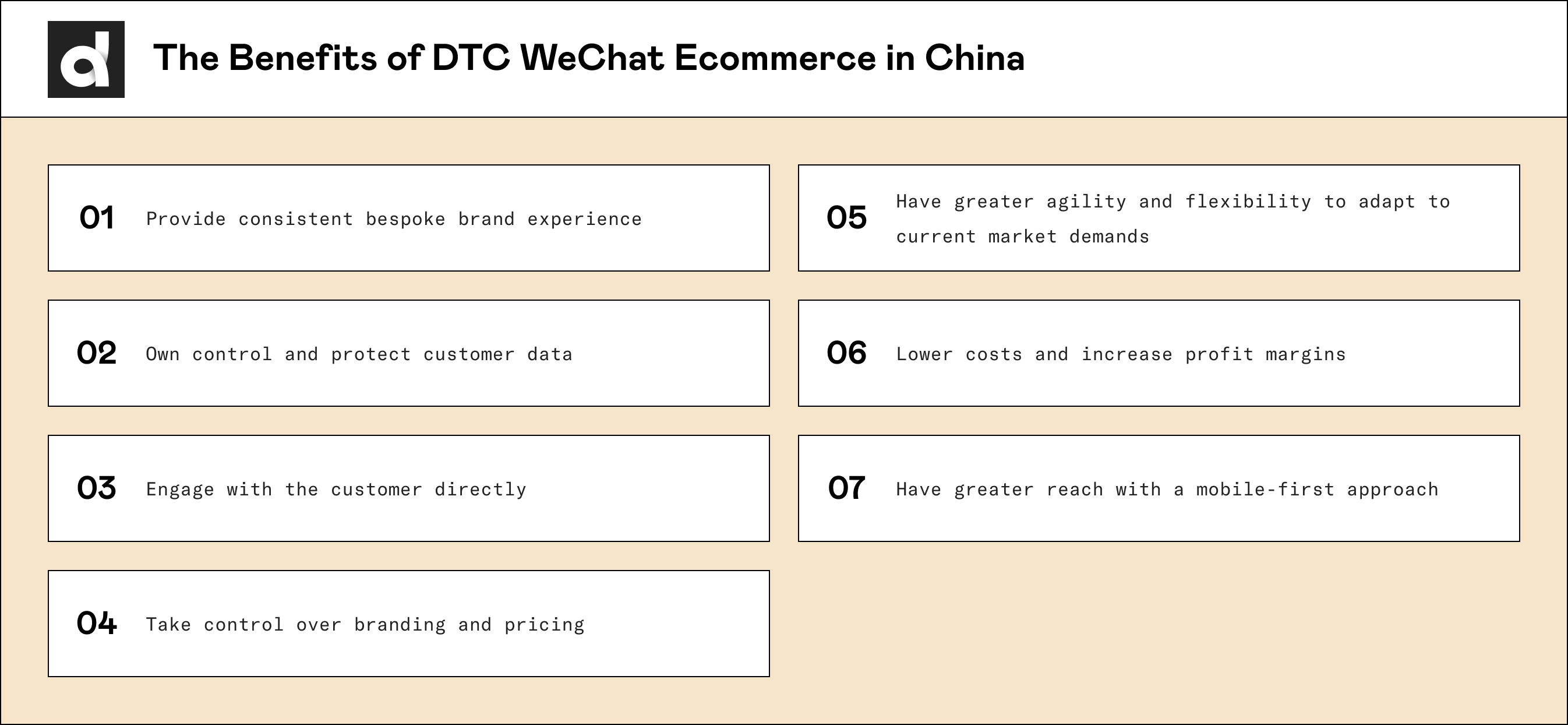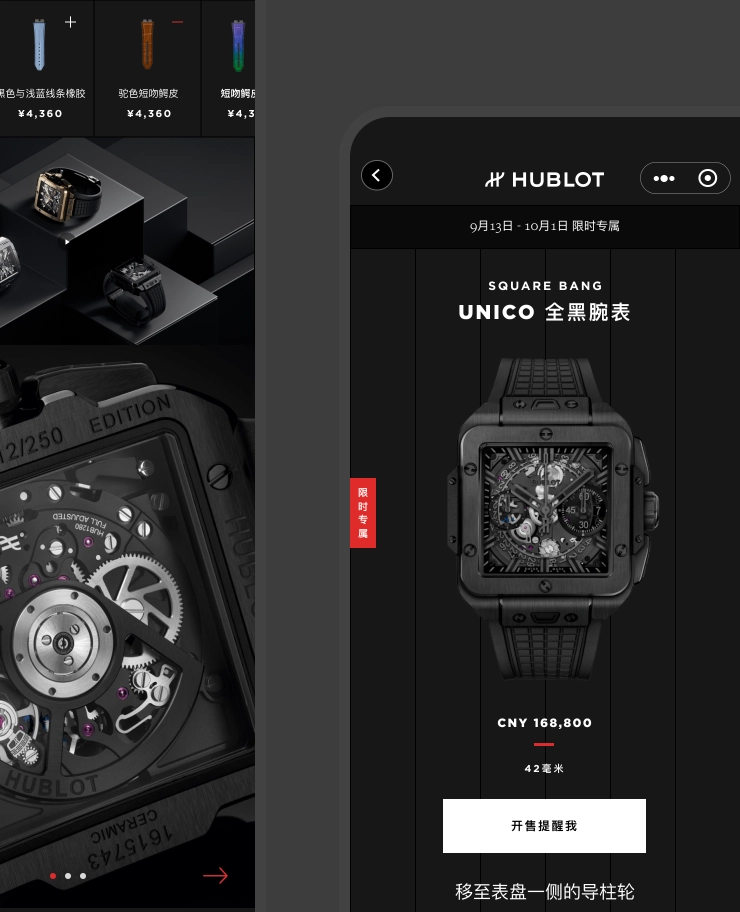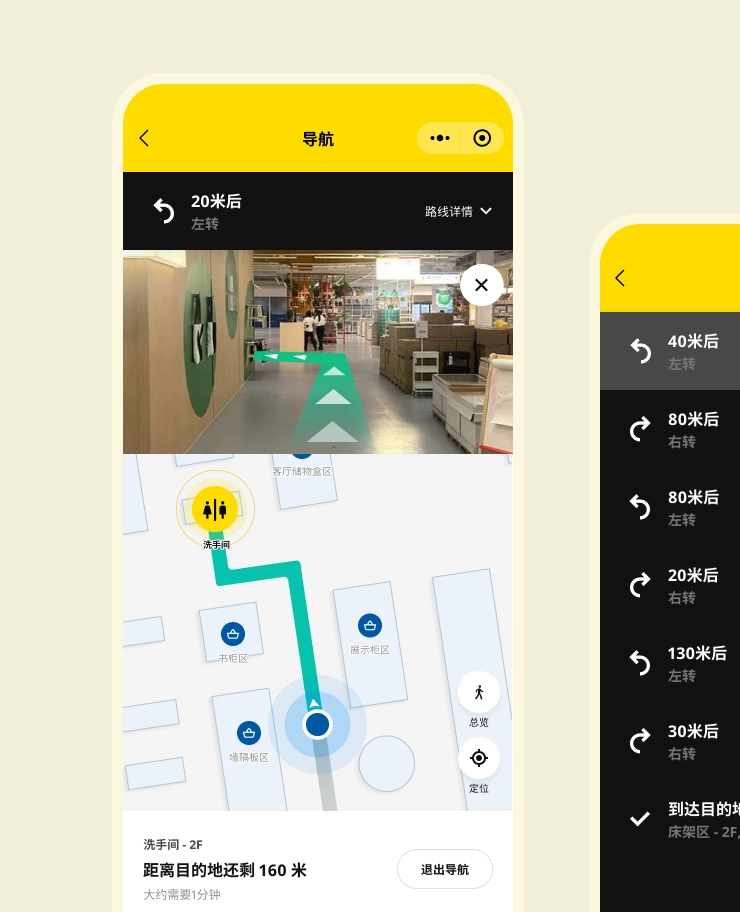Why Go DTC? Unlocking the Advantages of WeChat Ecommerce for Luxury Brands In China
April 13th, 2023 · Written by Samuel Jesse

Contents
The Chinese luxury goods market is projected to reach $53.16 billion in 2023, with an annual growth rate of 4.15%. To tap into this growing affluent market, local and global luxury brands are turning to direct-to-consumer (DTC) ecommerce strategies.
Rapid technological adoption, rising disposable incomes, and an increased preference for convenience in China have provided luxury brands with many opportunities but have also presented new challenges. Many brands need guidance with their ecommerce strategy to adapt to the turbulence caused by these changing consumer and technological trends.
While Tmall has traditionally been the go-to platform for luxury brands in China, many are now exploring custom-built WeChat mini-programs to create more personalized shopping experiences and gain customer data ownership.
What Is DTC WeChat Ecommerce
Direct-to-consumer (DTC) WeChat ecommerce is a digital solution that luxury brands in China use to sell their products directly to customers through their brand-owned WeChat official account. This approach bypasses traditional channels, such as Tmall, allowing brands to own and control their customers’ data and tailor the user experience.
A custom-designed WeChat mini program offers flexibility and creativity in presenting the brand and customer experience. Each step of the design and development process is optimized according to the brand's clienteling strategy, business goals, and objectives.
With over 1.2 billion monthly active users, WeChat is already widely used by luxury consumers in China. DTC WeChat ecommerce allows brands to create powerful acquisition funnels through written content marketing, video content, advertising on Moments, QR codes for instant offline to online access, and viral campaigns through users sharing on instant messaging, in groups, and on their Moments.
With DTC WeChat ecommerce, brands can cut out any intermediary third-party ecommerce marketplace and allow direct interaction and communication between the brand and the customer.
The Benefits of DTC WeChat Ecommerce in China
As the world's largest luxury market, China presents opportunities for luxury brands to expand their presence and boost sales. With the rise of digital commerce, choosing the right platform is crucial for success. DTC WeChat Ecommerce is emerging as a popular choice for luxury brands in China. Here are the top reasons why:

1. Bespoke Brand Experience
DTC WeChat Ecommerce allows luxury brands to create a seamless and immersive brand experience fully customized to their unique brand identity and values.
Luxury brands can customize the look and feel of their WeChat store, including the logo, colors, fonts, and layout, to create a consistent and premium brand image. They can also create engaging and interactive content, such as product stories, behind-the-scenes videos, and exclusive promotions, to captivate consumers and deepen their emotional connection with the brand.
2. Ownership and Control Of Customer’s Data
With WeChat ecommerce, brands fully own and control their customers' data, including demographics, user behaviors, browsing history, purchasing patterns, and customer support and communications. This allows brands to build their customer database and use the data for advanced clienteling, personalized marketing campaigns, and better customer support, providing a more tailored and customized experience.
It should be noted that it is essential to collect customer data lawfully in China, abiding by the country’s Personal Information Protection Law (PIPL).
3. Direct Consumer Engagement
DTC WeChat Ecommerce enables luxury brands to engage directly with consumers. Brands have complete control over the design, content, interactions, product presentations, checkout process, and communication within their WeChat mini program. Brands can provide real-time support, personalized recommendations, and promotions, fostering customer loyalty and driving repeat purchases.
4. Greater Control Over Branding and Pricing
Unlike Tmall and other marketplaces, DTC WeChat Ecommerce gives luxury brands full control over their branding, pricing, and promotions. This allows brands to maintain their premium positioning, control their product assortment, and optimize pricing strategies, resulting in higher profit margins.
5. Flexibility and Agility
DTC WeChat Ecommerce offers greater flexibility and agility for luxury brands to adapt to changing market trends and consumer preferences. Brands can quickly launch new products, test marketing strategies, and iterate based on consumer feedback. This allows brands to stay ahead of the competition and quickly respond to market dynamics.
6. Lower Costs and Greater Margins
Compared to Tmall and other marketplaces, DTC WeChat Ecommerce typically involves lower costs, such as lower commission fees, making it more cost-effective for luxury brands. This results in higher profit margins and better control over pricing and profitability.
7. Mobile-First Approach
WeChat is a mobile-first platform, and WeChat ecommerce is optimized for mobile shopping. As mobile commerce continues to grow in China, having a mobile-optimized shopping experience on WeChat can be a significant advantage, as it caters to the preferences and behaviors of Chinese consumers who are highly mobile-savvy.
Overall, leveraging DTC WeChat Ecommerce allows luxury brands to create a differentiated and exclusive shopping experience for consumers, driving brand loyalty and ultimately boosting sales in the competitive Chinese luxury goods market. With its seamless and immersive brand experience, direct consumer engagement, and greater control over branding and pricing, DTC WeChat Ecommerce presents a compelling opportunity for luxury brands to establish a strong online presence and drive business growth in China's evolving luxury goods market.
Have a project in mind?
Join our newsletter!
Get valuable insights on the latest digital trends, strategies, and developments in China and globally delivered straight to your inbox.

